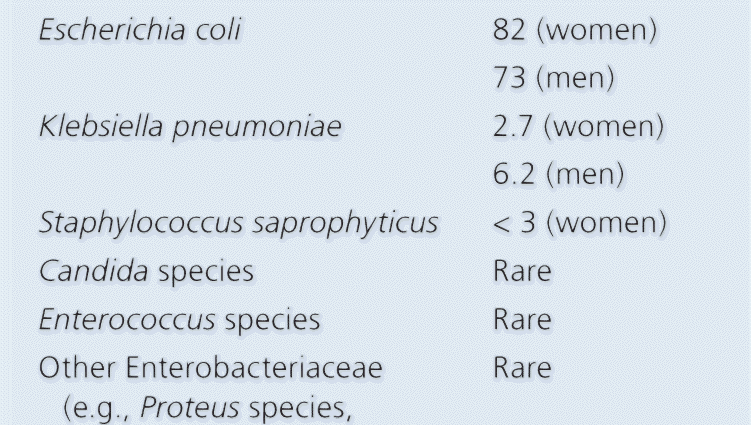Contents
Causes of pyelonephritis in women
The cause of pyelonephritis in women is opportunistic flora, which is contained in the body of each person and manifests itself with stress and a decrease in immunity. By the way, women suffer from pyelonephritis 4-5 times more often than men due to the peculiarities of the genitourinary system: the length of the urethra in a woman is only 3-4 centimeters, and is also very close to the rectum, so it is easy for pathogens to reach the genitourinary tract and then up to the kidneys. Most often, pyelonephritis in women is caused by Escherichia coli, as well as staphylococci, enterococci and Pseudomonas aeruginosa.
– With pyelonephritis of the kidneys in women, the pelvicalyceal system, tubules and epithelial tissue become inflamed, while the glomeruli themselves are not affected by inflammation. As a rule, one organ is affected, but bilateral pyelonephritis also occurs, – says urologist Ivan Kuvin.
Symptoms of pyelonephritis in women
Acute pyelonephritis in women:
- a sharp increase in body temperature to 39-40 degrees;
- chills, headache, weakness;
- severe sweating, especially at night;
- rapid and painful urination;
- cloudy urine with flakes, with an admixture of pus and an unpleasant odor;
- dry skin, swelling under the eyes;
- painful aching sensations in the lumbar region, may intensify when walking.
The patient may complain of lack of appetite and intense thirst. Sleep may be disturbed – insomnia torment at night, and weakness and drowsiness roll in during the day. The skin and mucous membranes become dry, the eyelids may swell a little (the notorious “bags” under the eyes), says the doctor.
Chronic pyelonephritis in women can often be almost asymptomatic. The temperature may rise slightly, accompanied by chills and heavy sweating, aching pains or heaviness in the lumbar region will appear. Patients note that at night they constantly experience the urge to urinate. Blood pressure often rises, sometimes anemia appears.
Diagnosis of pyelonephritis in women
With any of the above symptoms, you should immediately contact a urologist or nephrologist. At the appointment, the doctor will first carefully listen to the patient’s complaints, collect an anamnesis, then conduct an examination.
– Determination of Pasternatsky’s symptom – a diagnostic method that a doctor uses when examining if kidney dysfunction is suspected. The patient is standing, the doctor puts his left hand on the lumbar region, and with the edge of his right hand he taps on its back side. If the patient feels pain, then the symptom is positive and there is a problem with the kidneys. A set of necessary examinations is also prescribed – blood tests, urine tests, ultrasound of the kidneys, says the urologist doctor.
Methods for diagnosing pyelonephritis:
- general urine analysis;
- urine tests according to Nechyporenko, according to Zimnytskyi;
- general and biochemical blood tests;
- bacterial culture of urine to identify the pathogen and its sensitivity to antibiotics;
- Ultrasound of the kidneys;
- if necessary, CT or MRI.
Treatment of pyelonephritis in women
In the treatment of pyelonephritis in women, bed rest is mandatory. To eliminate the causative agent of the disease, based on the results of the antibiogram, a course of broad-spectrum antibiotics (penicillin, cephalosporin, carbapenem, quinolone) is prescribed. In severe cases, the urologist may prescribe a combination of several drugs. After antibiotics, a course of uroseptics is prescribed. To relieve inflammation and pain, the doctor will prescribe antispasmodics.
On the 5-7th day, when the inflammatory process begins to subside, symptomatic treatment is prescribed: non-steroidal anti-inflammatory drugs, drugs that improve blood circulation in the kidneys, vitamins.
– Medicinal herbs also help in the treatment of pyelonephritis in women. You can brew herbal teas yourself, herbal teas – lingonberry leaf, field horsetail, bearberry. And for convenience, you can choose drugs in the form of tablets based on these herbs – Cyston, Canephron, Fitolizin. Usually they are used in complex therapy, they relieve discomfort well and prevent the recurrence of the disease, says the urologist.
If you follow all the doctor’s recommendations, relief comes as early as 2-3 days of treatment, the entire healing process takes about two weeks. After that, you need to visit a urologist once a year, take a urine and blood test.
Prevention of pyelonephritis in women
Prevention of pyelonephritis in women is quite simple. It is enough to follow a few simple rules and carefully monitor your health.
- avoid hypothermia, especially in the lumbar region;
- do not neglect the rules of personal hygiene;
- do not start the treatment of cystitis and other diseases of the genitourinary system;
- regularly undergo examination by a gynecologist;
- lead a healthy lifestyle: do not abuse salty, spicy, smoked foods and alcohol;
- observe the drinking regime – accustom yourself to drink at least 1,5 liters of clean water per day;
- for any disturbing symptoms, do not self-medicate, but immediately consult a doctor.










